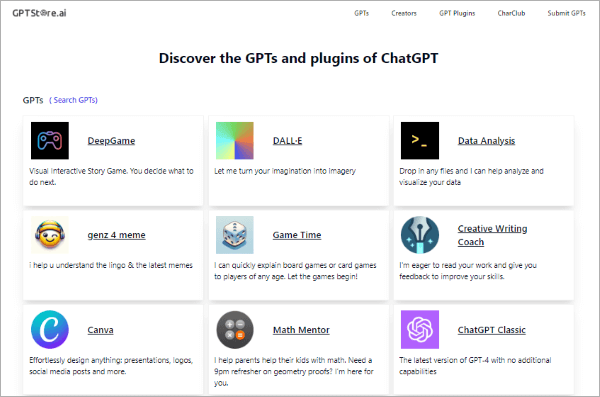GPTs, introduced during OpenAI DevDay on November 6th, are personalized versions of ChatGPT created by users. Constructing your customized GPT involves providing specific instructions for an AI chatbot, and OpenAI's GPT-4 model responds accordingly to input prompts. You can create your GPT using the GPT Builder or replicate those shared by others at no cost. Furthermore, starting later this month, you'll have the option to purchase and sell these personalized bots. Wonder more about GPT Store? Here, we introduce something worth checking out.

- Part 1: What's GPT Store? When Will It Be Released?
- Part 2: How Does GPT Store Work?
- Part 3: What Are the Best GPTs As of Now?
- Part 4: How to Build Our Own Custom Chatbots?
- Part 5: How Can Developers Earn Money through the GPT Store?
- Part 6: What Are the Differences between the GPT Store & Apple/Google App Store?
Part 1: What's GPT Store? When Will It Be Released?
* What Is GPT Store?
The GPT Store serves as a marketplace where users can explore and utilize various GPTs. Verified GPT builders can showcase their creations in a searchable storefront, making it accessible to all without the need for coding experience. Users can easily program and customize their GPTs through conversations with the AI.
* When Will the GPT Store Be Released?
Later this month (November 2023), users will have the opportunity to earn money based on the usage of their GPTs. OpenAI's CEO, Sam Altman, plans to compensate those who build the most useful and widely used GPTs with a portion of the company's revenue.
Part 2: How Does GPT Store Work?
The GPT Store connects users to ChatGPT, the underlying AI system for all GPTs. Trained on diverse datasets, ChatGPT generates text in various styles and adapts to different contexts. Users customize their GPTs by adding actions or knowledge, such as external services or additional information.
Once a GPT is created, it can be shared on the GPT Store, a digital marketplace allowing GPTs to be searchable and listed on a leaderboard. Developers can earn money through the GPT Store by sharing and publishing their creations, although the specific revenue-sharing scheme is yet to be disclosed by OpenAI. Developers will receive a portion of the revenue generated by the GPT Store.
Part 3: What Are the Best GPTs As of Now?
As per OpenAI, GPTs offer a novel approach for individuals to customize ChatGPT for enhanced assistance in their daily lives, specific tasks, or various environments and share these adaptations with others. Although the GPT Store is newly launched, the current selection of available GPTs is limited. OpenAI has showcased examples, such as Canva and Zapier AI Actions, for users of ChatGPT Plus and Enterprise to explore.
While there isn't an official ranking of the best GPTs, some websites compile lists of top GPT sites and apps. For instance, This Online World features a compilation of the top 30 GPT sites and apps, including platforms like Branded Surveys, The Negotiator, Swagbucks, Game Time, Survey Junkie, Data Analysis, Fitness Buddy, etc.
Part 4: How to Build Our Own Custom Chatbots?
OpenAI, the company responsible for ChatGPT, has recently introduced a method that enables individuals to develop their customized version of ChatGPT. These personalized versions, referred to as GPTs, can be easily created to align with your company or personal objectives within minutes. Here's the drill:
- Visit chat.openai.com and sign in.
- Navigate to "Explore" in the sidebar and select "Create a GPT".
- Input your instructions in the message box on the "Create page".
- Engage in a conversation with the GPT builder until you achieve the desired results.
- Click "Configure" to implement advanced customizations to your AI assistant.
- This may include changing the chatbot's name, fine-tuning instructions, uploading knowledge files, and setting up actions.
- Save your changes and choose the sharing options for your custom GPT.
- Confirm your selections.
Part 5: How Can Developers Earn Money through the GPT Store?
Creators have the opportunity to generate income based on the utilization of their GPTs, mirroring the App Store model. This model underscores the significance of visibility and usability through features such as searchability, leaderboards, and spotlight categories.
OpenAI intends to compensate creators by providing them with a portion of the revenue generated by the most widely used and valuable GPTs. Although the precise revenue-sharing structure and the potential for direct charges are still in development, the initial strategy prioritizes a revenue-sharing approach, with potential considerations for subscription models down the line.
Although specifics about revenue sharing remain undisclosed, developers will receive a portion of the GPT Store's generated revenue.
Part 6: What Are the Differences between the GPT Store & Apple/Google App Store?
The GPT Store, akin to the Apple App Store and Google Play Store, facilitates the distribution and monetization of GPTs to a broad audience. However, distinctions exist between the two platforms. The GPT Store is tailored for GPTs, versatile conversational AI systems used for applications like chatbots and language translation. In contrast, the Apple/Google App Store is designed for mobile applications that run on mobile devices, serving diverse functions.
Furthermore, the GPT Store is a nascent platform still undergoing development, while the Apple/Google App Store is a well-established, mature ecosystem with years of existence. The GPT Store's focus is on monetizing GPTs, with creators earning income based on usage and popularity. This is unlike the Apple/Google App Store, which monetizes mobile applications through in-app purchases, subscriptions, and advertising.
All in all, The GPT Store, a platform for sharing GPTs and creating custom chatbots, differs from the broader application offerings in the Apple and Google stores.
Concluding Thoughts
The GPT Store is an innovative initiative democratizing AI, offering a marketplace for top-notch GPTs. It empowers users to explore a range of AI applications, from practical to entertaining. Despite its promise, the GPT Store introduces challenges like data privacy and digital disruption. Collaboration among users, developers, and regulators is crucial to making it a safe and beneficial platform for all. Finally, stay tuned with us for the latest updates on the upcoming GPT Store, especially if you're AI-focused.




